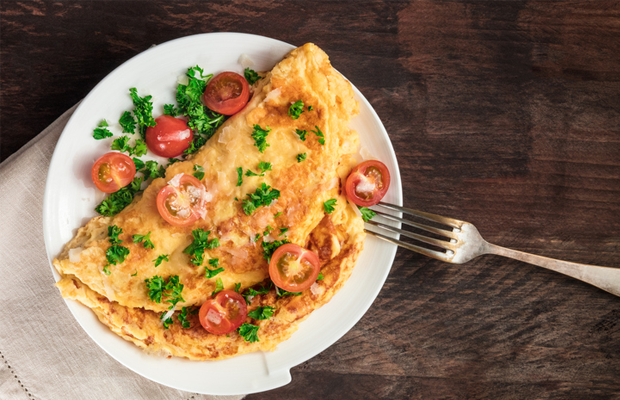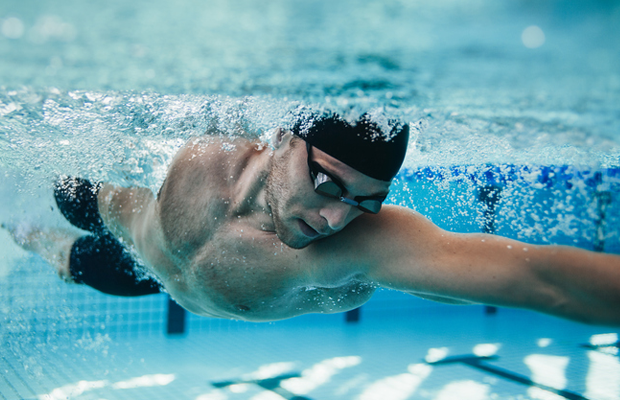A grandfather who faced delays for chemotherapy is told his condition is terminal.
Daily Archives: 06/02/2018
Daily chats improve lives of people with dementia, study says
Nearly 70 care homes took part in the trial, which found reduced anger and agitation in participants.
Study shines new light on how Salmonella ‘die’ at low temperatures
[unable to retrieve full-text content]

‘Virus-cracking’ molecules advance fight against hepatitis B
[unable to retrieve full-text content]

No volcanic winter in East Africa from ancient Toba eruption
[unable to retrieve full-text content]

NHS to use new type of flu jab next winter
Experts say the vaccine being recommended should offer better protection to elderly people.
Health24.com | 16 totally doable weight-loss resolutions you should commit to this year
Over the next year I will…
1. Sleep on my side
The Sleep Assessment and Advisory Service says that other positions interrupt your breathing. This wrecks your shuteye and puts 1 318 more food kilojoules in your grocery basket the next day.
Dr Colin Chapman of Uppsala University says lack of sleep makes you “less capable of self-control, leading to impulsive, craving-driven purchases.”
Duvet-tugs-of-war also sabotage sleep.
Read more: These 5 crazy facts will make you want to sleep naked. Every night
2. Be vague about my weight-loss target
When establishing your goal, think of the number of kilograms you want to lose, then subtract two.
Giving yourself a range for weight loss keeps up your motivation when you step on the scales for your daily weigh-in, found the Journal of Consumer Research.
Broadening your goal also makes you more likely to hit your target.
3. Make eating an effort
Load up on snacks that take a bit of work to consume, such as pistachios in shells, unpitted olives or reluctantly deskinned oranges.
“Foods that need to be shelled or peeled curb the autopilot eating that leads to massive consumption,” says Caroline Farrell from the Institute for Optimum Nutrition.
4. Crack some eggs
Research has shown that people who like theirs in the morning lose 65% more weight than those who scoff a bread-based breakfast with the same number of kilojoules.
An omelette with two eggs and cheese “utilises the protein and calcium to increase satiety for the day,” says nutrition consultant Drew Price.

Read more: These seven simple rules will get you ripped
5. Break the breakfast habit
If you eat breakfast regularly and then start cutting it out occasionally, you may feel hungry, but it will also stop you from overeating at subsequent meals, says Dr David Levitsky, a nutrition scientist at Cornell University.
He found that occasional breakfast dodgers ate 1 700 fewer daily kilojoules than usual.
6. Play it cool
Researchers at Brunel University have discovered your workout playlist is most effective if it makes keeping time difficult.
“Jazz creates interference between your body and brain, blocking out the sensations of fatigue,” saysDavid Lee Priest, a bio-psychologist at the University of East Anglia. Ungroovy as that may sound, it means you’ll burn more weight each session.
7. Scent out the appeal of an orange
Just the sight and smell of healthy foods can improve your self-discipline.
“Smelling an orange reduces the kilojoules eaten by subjects by more than half,” says Nicola Buckland, a researcher at the University of Leeds. “Just looking at a picture of healthy food has a similar effect.”

8. Eat an apple, just for starters
Apples have been found to produce a hormone called GLP-1 in the body, which turns off hunger alerts in your brain.
Researchers from the University of Iowa discovered that participants in a study ate 15% fewer kilojoules after chomping on the fruit before they consumed their biggest meal of the day.
Read more: The 4 worst and best things to eat before bed
9. Buy food online
It doesn’t matter whether it’s on your browser or your phone, but ticking off your food shop on a list helps you lose an extra half a kilo every month, according to a study at Monash University.
“A predetermined list commits you to buy only the items on that list,” says researcher Dr Nicole Au. (Note: this falls apart if a family pack of Lay’s is on there.)
10. Exercise on empty once a week
“When you wake up in the morning your body is depleted of carbs,” says conditioning coach Rob Blair. “Cardio will cause your body to raid its fat stores to get the energy necessary for 30 minutes on the rower.”
A “cardio-fast” session like this equates to just more than 1 255kJ.

11. Drink tea in the afternoon
If your Friday afternoon treat is usually doughnut-shaped, a fruity brew at 15:00 will boost your willpower. This is when your blood sugar slumps and leaves you vulnerable to treats. Tea will save you from getting your glaze on.
12. Finish workouts with a glass of milk
Research published in the International Journal of Obesity shows that people reward themselves with a post-workout, kilojoule-dense treat to the tune of 920kJ.
Swerve it by necking a glass of the white stuff and you’ll only take on 343kJ while receiving the muscle-repairing benefits of a protein shake too.
Read more: How much post-workout protein do you really need?
13. Complete a brick session
This triathlon drill burns 1 839kJ and leaves you with a raised metabolism: ride a bike for 15 minutes, followed by a 15-minute run. Without rest, hop back on the bike for 10 minutes and finish with a 10-minute run. Easy.
14. Swim like a butterfly
Front crawl or breast stroke are nothing to swim home about, but get a couple of lessons in the butterfly and you’ll master the most fat-burning stroke in the pool. It burns 627kJ for every 10 minutes you can keep it up. Not so easy.

15. Take a hit (or two)
Impact sports like rugby and squash cause your body to convert cells into lean tissue, not fat. A study in Research Quarterly for Exercise and Sport found these sports send signals to the body that it needs to be protected by muscle – so at a cellular level it does just that.
Read more: 3 boxing moves that can make you stronger and faster
16. Switch my exercise programme
By now, results should start to become visible, but according a Mayo Clinic study, your metabolism slows as you begin to lose body mass.
To stop your results from flatlining, swap your usual gym session for half an hour of kickboxing (to burn 1 804kJ) or don your wetsuit and get out on the water with a surfboard for an hour (2 656kJ).
This article was originally published on www.menshealth.com
Image credits: iStock

Health24.com | What is time-restricted eating and can it help you lose weight?
If the idea of counting kilojoules to lose weight sounds like the absolute worst, a buzzy concept called time-restricted eating (TRE) might be more up your alley.
Time-restricted eating is basically a form of intermittent fasting, which has gained traction thanks to diet books such as The 5:2 Diet and The 8-Hour Diet.
Based on the theory that most of us spend way too many of our waking hours munching away, this diet method is as simple as shortening the number of hours during the day that you eat.
That could mean eating only between noon and 19:00 or 08:00 and 14:00 (it’s up to you to decide how many hours you want to eat or fast per day). But the greatest benefits of time-restricted eating seem to occur when you stop eating earlier in the day.
Read more: The 7 lowest kilojoule fruits you can find in any supermarket
For example, in one new study from the University of Alabama at Birmingham, when 11 overweight men and women spent four days eating only between 08:00 and 14:00 (a “restricted” schedule), and then four more days eating between 08:00 and 20:00, researchers found that time-restricted eating ramped up how much fat they burned at night.
And, ironically, it led to fewer cravings throughout the day.
Granted, this was a small study, and the researchers note that more research will be needed to determine if time-restricted eating could lead to long-term weight loss. Still, previous animal studies suggest that TRE may effectively help lower body fat and cholesterol levels, and even improve insulin sensitivity.
Plus, a 2017 review from the University of California, San Diego, shows that, in some cases, TRE can indeed lead to weight loss in both men and women.
Essentially, this style of eating revs your metabolism, says Eliza Whetzel-Savage, a registered dietitian with Middleburg Nutrition in New York City.
“When you cut the eating window down, you are creating a fasting period in which the body will have to use its own stored glycogen from carbohydrates and fat as fuel,” she says. “When the glucose and glycogen stores are used, the body switches over to a ketogenic state and burns fat for fuel.”
Still, the diet has its challenges.
Read more: The dangers of garcinia cambogia extract diet pills: what you need to know
TRE in real life
If you haven’t already guessed, time-restricted eating can be challenging, especially if you’re a snacker or someone who doesn’t like to eat much early in the morning, says Whetzel-Savage. You could easily wind up eating too few calories, developing nutritional imbalances, or building an unhealthy relationship with food.
“The success of it really depends on the quality of the food choices in the eating period,” she says. “If you’re making poor nutritional decisions during that time, you probably won’t see any weight loss, even if you fast. But, if the fasting period ‘crowds out’ bad eating habits in the evening and your overall kilojoules intake goes down, then some people might see weight-loss results.”
But even if dieters eat healthy, balanced meals during their “feasting” window, Whetzel-Savage explains that TRE could still be problematic for people who exercise frequently, and those with blood-sugar issues or diabetes.
After all, if you go seven, eight or more waking hours without eating, you could be putting yourself at risk of low blood-sugar levels. Heck, for some women, going even four hours without food is a recipe for hanger, fatigue and dizziness.
Read more: 6 signs your metabolism is out of whack
However, proponents of time-restricted eating argue that the body quickly adjusts to a shortened “feast” window, and that it’s actually what our bodies crave, at least from an evolutionary standpoint, says Traci Fields, and in New York City.
Our ancestors didn’t have constant access to food, so fasting was normal, and we already fast overnight naturally.
“I use intermittent fasting all the time with my patients,” says Fields. Typically, she recommends limiting food intake to seven hours throughout the day.
“During the fasting period, you can have as many kilojoule-free fluids as you want, like teas and coffee. If you need to crunch on something, celery is a great option that won’t really impact the fast, and broth or a green vegetable juice can be helpful as a snack during the no-eating period before people adapt,” she says.
Read more: These foods will help you stay full longer – and they’re not all high in protein
Final call
Realise that, even if you don’t want to go hardcore with TRE, dialling back on excessive late-night noshing can be an easy way to cut down on eating that may have way more to do with cravings and stress than actual hunger, Whetzel-Savage says.
And it can still help sync your eating patterns to your circadian rhythms.
For example, try to quit eating two to three hours before bed, she says. That will allow for at least a 12-hour fast every night and into the early morning.
Meanwhile, when people have a hard time swallowing the whole TRE thing, Fields starts clients off with an overnight fast, starting at 19:00 and lasting until breakfast. “Then they can slowly extend the fast,” she says.
In the end, TRE is only worth trying if it fits your lifestyle and helps you feel good. So if you want to give it a try, that’s up to you and your doctor. But always listen to your body – and if it needs food, feed it.
This article was originally published on www.womenshealthma.com
Image credit: iStock
NEXT ON HEALTH24X

Health24.com | When should you see a doctor for urinary incontinence?
You know it’s happening – as you cough or sneeze, you feel a small bit of leakage. You have put off seeing a doctor because you are too embarrassed to talk about it. You also regard it as more of an inconvenience and embarrassment than a health threat.
No single treatment
However, upon investigation we found that any incontinence should be seen and treated as a medical condition – and you should see your doctor without delay, even if you’re dreading the appointment.
Urinary incontinence isn’t an illness itself, but a condition that could have a serious underlying cause. There are different factors that can cause urinary incontinence. There is no single treatment for incontinence itself, and your options will depend on the type and severity of your incontinence.
Dr Prenevin Govender, a urologist based in Claremont, Cape Town, and Health24’s go-to expert for incontinence, says, “Incontinence is never ‘normal’ and if you experience it, you should always go to your doctor. In some cases, your doctor may refer you to a urologist.”
So if you are still embarrassed or wondering if a bit of “leaking” now and then is serious enough to warrant a doctor’s appointment, you have your answer. It’s even more important to go in the following cases:
1. When your incontinence happens suddenly
Sudden incontinence can be an indication of an underlying medical problem such as urinary stones or tumours. It is best to make an appointment with your doctor to establish the cause as soon as possible.
2. When your incontinence is affecting your lifestyle
Embarrassment caused by incontinence can be kept to a minimum as there are options available. If you find you need to use absorbent pads and frequently need to change underwear, and if you are anxious about exercise, intimacy and being too far from a bathroom, you need to see your doctor.
3. When you constantly experience a full bladder
If you frequently experience bladder pressure to such an extent that you are permanently uncomfortable, you need to see your doctor as this may signify an underlying condition.
Prepare for your doctor’s appointment
Are you struggling to pluck up the courage to see your doctor? It doesn’t need to be scary.
- Drink water beforehand – your doctor might ask you for a urine sample.
- Come with questions and don’t be embarrassed to talk openly to your doctor.
- Discuss your medical history and things that may possibly increase your risk for incontinence such as vaginal births, pregnancy, or menopause.
- Be prepared to be referred to a urologist if there is an underlying problem.
Image credit: iStock




